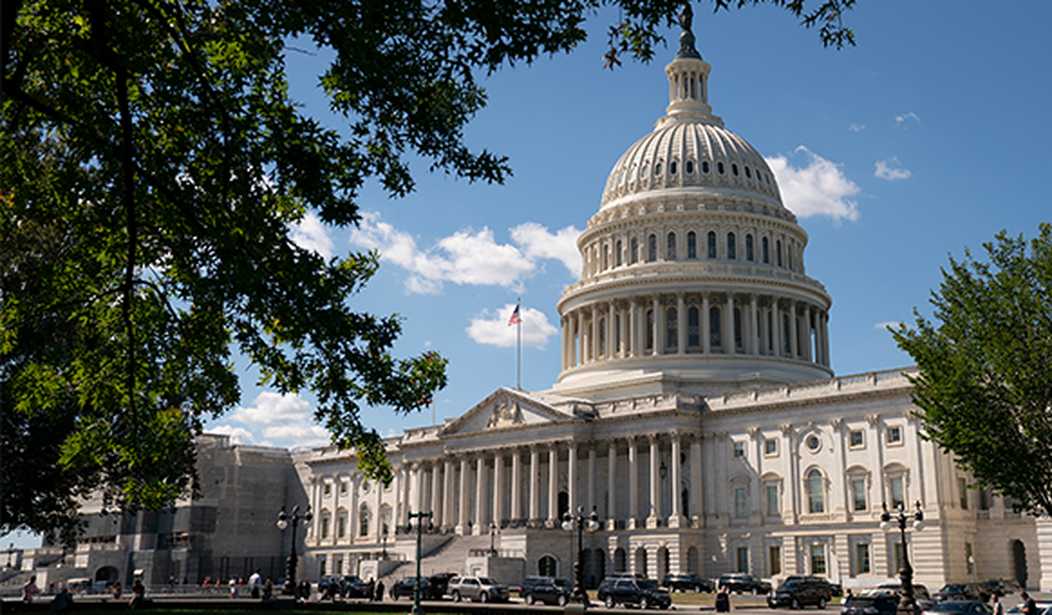It was nearly 50 years ago that a liberal Congress completely dominated by Democrat big spenders passed a new set of budget rules -- the Congressional Budget and Impoundment Control Act of 1974.
It has been a complete and unmitigated disaster. Since the act's passage, the budget has been balanced four times and unbalanced 46 times. This was by design. Despite being called a "budget reform" law, the act was intended to grease the skids for new spending, but even Congress members the '70s who designed it that way couldn't have imagined the Pandora's box of spending and debt it uncorked.
The law's intention was to loosen restrictions on congressional spending, and to that extent, it worked.
This year, Congress hit a new low. Even with record-high deficits of nearly $2 trillion a year, Democrats and Republicans on Capitol Hill held hands in bipartisan agreement to spend $95 billion on a foreign aid bill for Ukraine and Israel without ONE PENNY being paid for with offsetting spending cuts -- even though the flabby budget now exceeds $7 trillion.
Both parties have bought into the idea of "modern monetary theory," a crackpot scheme that says the U.S. government can spend and borrow to kingdom come -- which may arrive a lot sooner than we think if we stay on this financial path. In just the first three months of this year, Congress borrowed another half-trillion dollars. The members of Congress should be wearing T-shirts that read, "Stop us before we spend again!"
Recommended
I'd like to suggest some common-sense ideas; it's time for citizens to impose a fiscal restraining order on Congress and the White House.
1. Presidential impoundment authority. The president, just like the CEO of a company, should have the power to suspend spending on programs if it is deemed unnecessary. Every president from Thomas Jefferson, who used the power to stop some ship building for the military, to Abraham Lincoln to Franklin Delano Roosevelt, who used the authority to end New Deal programs as the country entered World War II, to Richard Nixon exercised this control. In a $7 trillion budget, there are thousands of instances where money authorized by Congress is no longer needed. So let the president cancel it.
2. A super-majority vote requirement to raise taxes. President Joe Biden wants to balance the budget with $4 trillion of economically disastrous tax increases and no spending cuts. But it's the spending that is out of control, not the tax revenues. Any tax increase enacted by Congress should require a two-thirds vote in both houses to be approved. This is what many well-run state governments require, and there should be similar safeguards in Washington.
3. A millionaire subsidy elimination act. This is an idea the late, great economist Walter Williams and I proposed over a decade ago. The idea is that no individual with an income of more than $1 million should be eligible for federal aid payments, and no business entity with more than $1 billion in revenues should be eligible for federal corporate welfare subsidies. This would have rendered the so-called Inflation Reduction Act, with its tens of billions of dollars in handouts to green energy firms and semiconductor companies like Intel, null and void.
4. The budget stamps solution. Here's a simple idea that would effectively require a balanced budget each year. The concept was originally proposed by former Reagan administration economist John Rutledge. Under this plan, the government would issue a special blue currency called "budget stamps" that would be issued to all recipients of federal spending -- much in the way that food stamps are issued to poor people. But budget stamps' value would fluctuate with the amount of excess spending authorized by Congress -- much as the dollar fluctuates in value every day relative to the price of gold or other currencies.
Recipients of federal assistance, federal employees and those who run federal agencies would receive this year $6 trillion in budget stamps. (Interest on the debt is excluded.)
But that money in total would be worth only the amount of money expected to be collected in taxes that year. So if tax collections were estimated at 90% of the spending, then every budget stamp would be worth 90 cents, not a dollar. The bigger the expected deficit, the less a budget stamp would be worth.
This would create a competition for dollars between agencies and programs. Each dollar allocated to foreign aid programs would be one less dollar available for the Pentagon, Social Security recipients, defense contractors, green energy programs, bilingual education and sugar subsidies.
Deficits would be impossible, since the government under the new rule would be incapable of spending more than it took in. Because Congress's salaries (and staffs) would be paid in budget stamps, Congress would be financially incentivized to cut unnecessary and wasteful spending.
Almost no one in the Washington swamp will like these ideas -- all the more reason to adopt them.

























Join the conversation as a VIP Member